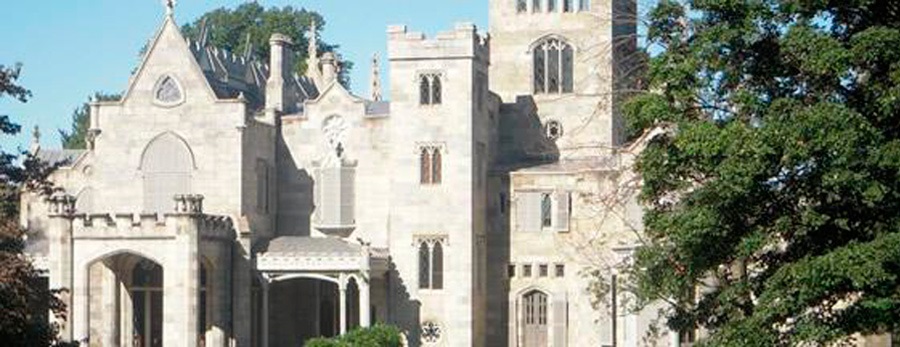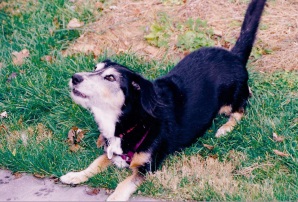- Holly and Dennis devise fool proof scheme for keeping Dickens in the yard.
My daughter, Holly, and her husband, Dennis, remember Dickens vividly. The Dickens I refer to is not the writer Charles Dickens—author of classic fiction novels such as Oliver Twist, A Tale of Two Cities, Great Expectations and twelve other much read novels, as well as various other literary genre. He died in 1870. Rather, I am speaking here of their dog a few years back, called Dickens. They are not old enough to remember the other fellow.
Their Dickens might have been the champion war dog of all time, in attitude if not size–a dog Attila the Hun would have killed for, literally. Indeed, the canine Dickens’ story might be every bit as heroic as paeans of the legendary Greeks who performed superhuman feats of speed and strength, with fantastic media coverage included for posterity. Indeed, perhaps Dickens the canine’s story is even more grandiose, considering he was neither god, nor deity, nor legend.
Why, he was never even a champion of the Westchester Kennel Club. But let’s begin his fascinating story, anyway. Maybe the uppity club will repent.

Early in November of 1990, Dennis was stage production manager and wife Holly was fund raising director of the Trinity Repertory Company in Providence, RI. One brisk autumn evening, they waited to cross busy Washington St. to attend the Trinity’s evening performance of A Christmas Carol, the play based on the Charles Dickens’ novella of 1890 that has been translated into Christmas theater fare all over the world.
Suddenly, in the twilight chill, the couple watched a short, extremely long dog scamper through pedestrians into their view, directly across the street and in front of the theater. A wrinkled document of some sort hung from its toothy mouth. They immediately worried the dog would jump out in front of an oncoming vehicle for it was feinting intentions to make a mighty leap off the curb and run toward them.
Next, the trampy dog fixated on them. It stood more erectly, head cocked to one side, staring excitedly and wagging its tail as though recognizing them. After several seconds, the dog retreated under the marquee, where early arrivals milled about. He was quickly out of sight.
In seconds, the screech of a truck horn awoke Holly and Dennis from a stupor at the curb, caused by the dog’s zany actions. Both of them felt compelled to solve the mystery. Holding hands, they zigzagged through the madcap traffic, until reaching the theater, where they began searching for the strange little dog. Immediately piercing the crowd’s jabber, sharp angry barks reached their ears like gunshots.
By following that commotion, they soon found the dog in a marquee corner nook, surrounded by vexed theater patrons attempting to grab the document from its elusive jaws. When the creature saw the couple, it clamped its mouth harder shut and scurried toward them. The group harassing it dispersed.
When it bounded alternatively into their open arms, acrid street odors from its fur nearly overcame them. Their hands took on the blotchiness of mucking about in the La Brea Tar Pits of Los Angeles. Its tawny brindled coat, streaky with grease and entangled with all sorts of sticky trash, suggested a long cleaning at a car wash was in order. Next, their gazes focused on the mishandled document in its mouth. They pried it out easily for the mouth had relaxed. It was a playbill of A Christmas Carol, the current Trinity presentation.
They discussed mockingly, whether extraterrestrial forces were working some sort of magic—a strange dog carrying a symbol of the theater’s current production finds them in a crowd. Remember, they were show people.
After the theater performance, they took Dickens home with them, where he soon resumed the attitude of a paranoid street dog. Even so, they cleaned him up, which he objected to violently. Next morning, they advertised in the newspaper his presence in their house, awaiting the heartbroken owner to rush over to reclaim the dog. But that fairy tale never happened.
Grudgingly, a few days later, when Dennis said he had a part for a dog in A Christmas Carol, they decided to keep the crabby alien, launching its thespian career; also, they provided a companion for their huge Golden Retriever, Nicholas. As a final act in the fateful decision, they christened the newcomer eponymously—”Dickens”—commemorating the dog’s dramatic appearance with that other Dickens fellow.

After consulting with an especially brave veterinarian, who seemed eager to end the interview with the feisty growler, they discovered Dickens’ breed was welsh corgi, with a little terrier thrown in. They are 11th most intelligent breed, and herded geese in olden days, when live stock was herded to market. Obviously, the Westchester Kennel Club lacked proper information; or, perhaps they knew a dud when they saw one. Welsh corgi dogs have won trophies there before. It seems highly possible that their snubbing of Dickens was the dastardly slight that caused him to go bad, in the first place. Surely, it is time for amends.
Dickens began a new life for the brave couple. He became a 24/7 vaudeville show, creating comedic skits spontaneously, with his sinister low-octave growls, strident barking splits of the airways and exposures of his oversize teeth for intimidation.
Although not necessarily in order, he did not like store Santa Clauses, veterinarians, mail persons, delivery persons, neighbors, visitors, police officers, dogcatchers, other dogs (except Nick), cats, pet store clerks, squirrels, repair persons, birds, trash collectors, automobile mechanics, dog sitters and home repair persons. Furthermore, he let them all know it.
In fact, Dickens only seemed to love—wait! make that tolerate Dennis. Probably, the big little dog regarded the stage manager as his tutor for acting, a vocation in which he was obviously insecure. Dennis was to receive a modicum of cordiality as the boss.
On the other hand, the vet offered an alternative to explaining Dickens’ affection toward Dennis. He said Dickens seemed sweeter, after the vet spayed him.

Dennis relished the special homage Dickens paid to him. So, when he had to fire Dickens early in the play’s engagement, it was difficult. However, he had no choice. Dickens’ part included a cast member leading him up the center aisle, during the show. The object was
to connect the audience and the play, a standard tactic in the theater. But how many theaters had to work with a character like the mad welsh corgi? When the audience reached out to touch Dickens, he snapped at them. Dennis had no choice, the lawyers said.
Finding himself jobless, during the greatest bull market in America’s history must have galled Dickens. Who can say? In playing out his life’s role of a spunky villain, he was already perfection. If he did grow madder and badder at being laid off, Holly and Dennis must have noticed it. However, by that time, they had grown to love his grit and individuality.
For fourteen years Dennis and Holly endured Dickens, before he died. It is possible, they were paying penance for some awful sin; although, it is hard to imagine anything so horrible. In response to my casual question, “Do you believe you helped Dickens with ‘people skills,'” they simply stared back, apparently dumfounded at my naiveté.
The following story wins the H&D trophy for “best in show.”

Fast forward several years. Dickens is alone at home in Alexandria, VA. The keyed up watchdog had experienced a trying day. Several vehicles backfired in front of the house, on a busy street that fed traffic onto the George Washington Parkway. Phones chirped like magpies, unusually often, by callers who simply would not believe nobody was home.
When the clock chimed three, it was time for the highlight of the day. On cue, Dickens heard the heavy winter shoes climb the porch stairs outside slowly, until the walker reached the porch. Dickens moved two-feet closer and got ready.
After 30 seconds passed, the occupant of the heavy shoes began running in place, each footfall slamming the cement hard and loud. Finally, Dickens watched as a gloved hand outside opened and closed the mail slot door repetitiously, rattling it until Dickens began to bark furiously, while his body seemed to levitate three inches, up and down.
When he started running toward the front door and back, snarling and growling, the time had come for the mail carrier’s tour de force. The gloved hand began stuffing envelopes through the two-inch mail slot, one by one, holding the small door up with the other hand. The thrower gave each missile a flick with his finger tips so that the envelope spun in an arc over Dickens’ head, reached an apogee, and plunged to the carpeted floor.
Dickens had a foil to this air attack. He became quite proficient at jumping in the air and catching each envelope in his mouth and shaking it violently until he destroyed the evil spirit inside. Then he fetched the next one. Sometimes, he missed catching the envelope, and gobbled it off the floor and chewed it up.
The mail carrier delivered 15 envelopes that day. Dickens chewed up every one of them, before he trotted from the entrance hall with a victory swagger.
Holly, who worked in development for the American Nurses Foundation in Silver Spring, MD arrived home about six o’clock. She expected Dennis, who managed stage production at Arena Stages in Washington, DC, about seven. As she was fixing dinner, Dickens came in the kitchen and sat, waiting for her to prepare his dinner bowl. She did so, and returned to a recipe book.

In a few minutes, she heard a ruckus on the floor. She turned around from the soufflé preparation, to contemplate Dickens pushing his food bowl around the slick linoleum floor. Actually, he was pushing and chasing it. He was angry, trying to bark but only issuing guttural croaks. From her perspective, he looked like a canine soccer player practicing his dribble, mad as hell.
When Dennis arrived, they knelt down to watch Dickens closer. He had eaten no food, but continued to sniff and waggle his head close to it. He would bend down to the food, growl and shake his head, but he would not eat. They were flummoxed, and decided to take him to the vet.
The animal doctor looked at Dickens’ mouth first. He tried unsuccessfully to open it manually, after he realized Dickens was not opening his mouth when he snapped at him. Under the bright examination lamp, he discovered the envelope glue, saliva and chewed paper had formed a kind of papier-mâché that cemented Dinkens’ mouth shut.
After the vet and an assistant cleaned out his mouth, Dickens was ready to go home. Hungry and tired, his running short legs were but a blur to the door. There, he turned toward the vet, and barked at him loudly and proudly.
“Dix the knife is back in town.”
Howard Bryan Bonham
Acknowledgments: All Dickens images from family albums; other images from creative commons licenses.